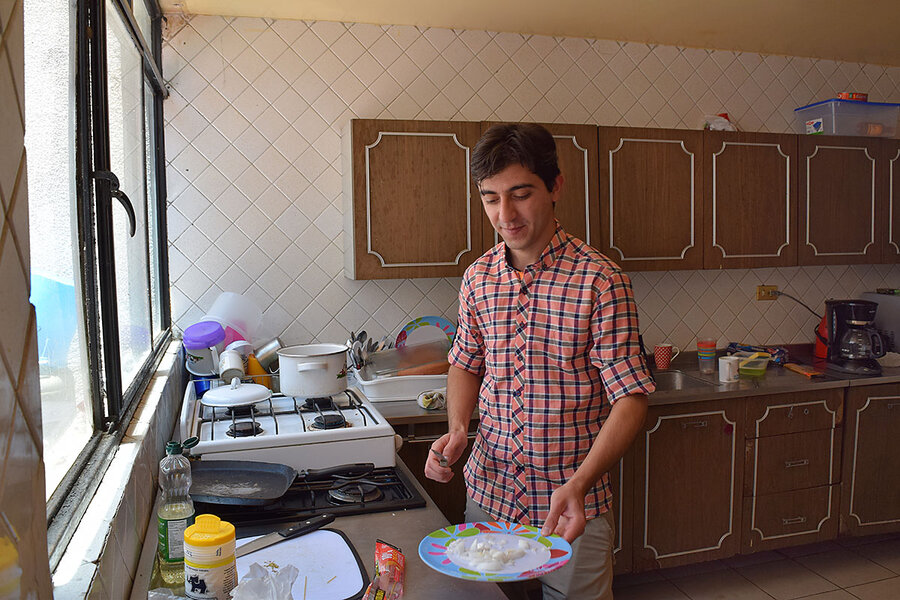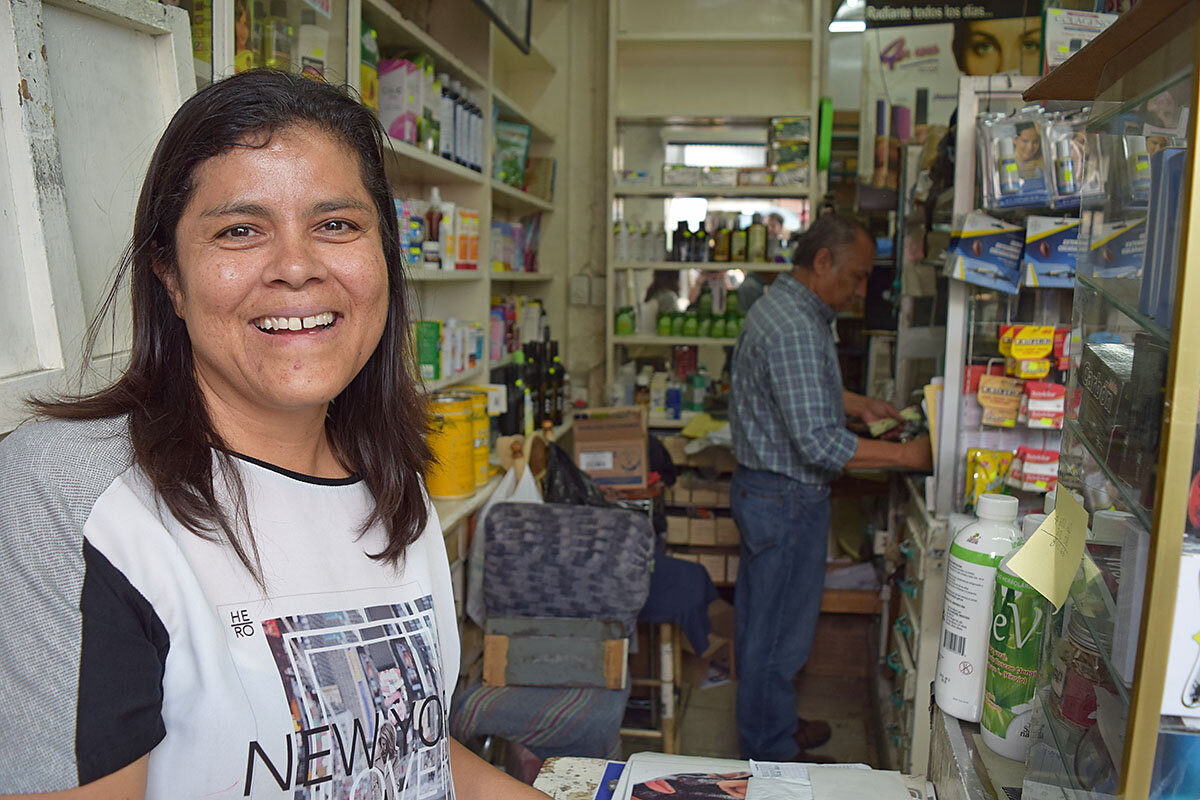Syrian students find an unlikely home, and hope, in Mexico
Loading...
| AGUASCALIENTES, MEXICO
Renas Farid Alahmed is poking around his rundown, shared kitchen on a recent afternoon, trying to plan the first lunch he’s ever cooked for guests.
“The kitchen is the one room in my family’s home in Damascus I can’t even picture anymore,” says Mr. Alahmed, who fled Syria seven years ago, as the war between President Bashar al-Assad and rebel groups was heating up. He’d just graduated from high school, and his family was concerned he could be in danger after participating in anti-government protests.
“It’s not only me. It’s very strange to find a man doing anything in the kitchen in Syria,” he says.
Learning to lend a hand in the kitchen is one of many adjustments Alahmed is making here in Aguascalientes, the central state in Mexico, where he arrived eight months ago.
He’s one of 14 Syrians brought to Mexico through The Habesha Project since 2015. The nongovernmental organization offers academic scholarships and living expenses for promising students whose education was interrupted due to the conflict in Syria. The program’s leaders say they hope the students can use their degrees to help rebuild Syria after the conflict ends.
But first, Alahmed and his peers must learn Spanish, adapt to a new culture, and figure out how to make Mexico home.
It’s a familiar process for anyone who’s uprooted his or her life and tried to start anew in a foreign land, like the nearly 5.6 million Syrians who have fled their country since 2011. But the process of fitting in and feeling at home is often invisible to those not experiencing it firsthand. And unlike Lebanon or Germany, where large numbers of Syrian refugees have settled, in Mexico the community of Syrian refugees is largely limited to these students. Their isolation from other Syrians hasn’t dampened their dedication to creating a new life in Mexico filled with evidence of their hopes for the future: safety, family, a career, belonging.
“Yes, Mexico is different: the culture, the religion, the community,” Alahmed says, as he tries to shoo a three-legged cat out of the kitchen in three languages. “But it’s also the same. The humanity is one.”
Language breaks down walls
Alahmed walks to his Spanish grammar class at the Aguascalientes Cultural Institute and sits at a metal desk in the front row while his instructor, Leonardo Duran Siqueiros, scribbles prepositions on the chalkboard.
“This is going to be really boring,” Mr. Siqueiros warns.
“It is my job to make them feel at home here,” he says later. “I take that seriously. Language breaks down walls. My class is about grammar, but it’s all part of the bigger picture.”
He’s learned a lot about Syria and the experience of displacement from his students, he says. After fleeing Damascus, Alahmed spent time in Lebanon, a Kurdish zone in Syria, Iraq, and Iraqi Kurdistan. Meanwhile, his family traveled across Turkey and Europe, seeking asylum in Germany. Last year, his mother, whom Alahmed considers his best friend, passed away. He wasn’t there to say goodbye.
“I try not to have them talk too much about their experience before coming here,” Siquieros says. “It can be really hard, especially for the students whose families are still in danger.”
What he has learned surprised him. “We share things culturally I never would have imagined,” Siquieros says, citing the importance of family, warmth toward foreigners, and a love of sweets. “I always heard negative things before working with them, like ‘Muslims are terrorists.’ It’s not so different from the stereotypes of drug traffickers and violence in Mexico.”
Saving wasted potential
Adrian Melendez, an Aguascalientes native, founded the Habesha Project in 2014 after years of working with refugees in the Middle East and seeing firsthand the crisis of displacement and lack of opportunities.
“Syrian people are so educated and so valuable. You realize all this potential and knowledge is being wasted in camps,” Mr. Melendez said in a 2015 interview with The Christian Science Monitor. “I realized Mexico can do something.”
Habesha has arranged to place 24 students at eight universities, a goal they are working toward. Funding comes from international NGOs, online campaigns, and individual donors.
For the first nine months in Mexico, students live here, in Aguascalientes. They take classes in Mexican history and culture, study Spanish, and home in on what they’d like to study the following year. Alahmed will study international relations at the Universidad Iberoamericana in Mexico City.
‘I tell them to call me their Mexican mother’
Alahmed says integrating into Mexican culture has been relatively easy for him, but he’s still learning the language and cultural norms.
Spanish is Alahmed’s fifth language, along with Arabic and two Kurdish dialects.
“Sometimes I don’t know what language I’m thinking in, let along talking,” he says.
“What if I’m invited to a party and they offer me something to drink? I don’t drink alcohol, but I don’t want to bring them shame,” he says.
“When I arrived here and girls kissed me [hello on the cheek], I said, ‘Oh my God, what is going on here?’ ” he recalls, laughing. When a friend explained the greeting custom here, “I thought, ‘OK, I like it!’ ” Alahmed says, noting that you’d never see that in Syria.
Family and old friends are what he misses the most.
“I have a lot of friends in Syria,” he says. “I am always looking for them. I don’t know if they’re alive, or in jail, or killed. I don’t know anything about them.”
He talks with his dad and three sisters on video chat every morning. Two of his sisters have daughters now. They’re building lives in Germany, a country he’s never known. Missing milestones weighs on him.
That’s where local pharmacy-owner Claudia Mora comes in. When Alahmed turned 25 a few months ago, she showed up at the Habesha offices with a piñata and cake. It’s something she does for all the students, along with inviting them to weekend barbecues and offering to provide furniture and supplies.
Neighbors tell her she’s playing with fire, inviting Muslims into her family’s life.
“This is their home now too,” she says. “I want them to feel a part of the family. It’s something very Mexican. You feel love, you see someone who needs love, and you give them that love.”
“I tell them to call me their Mexican mother.”
‘Mexico has opened my mind’
Alahmed enters a convenience store near the Habesha offices to shop for the lunch he will prepare for other students and office staff. He’s decided on spaghetti.
Back in the kitchen, Alahmed boils water for the pasta and chops an onion. It takes him almost 2-1/2 hours to finish cooking.
The group slurps up the pasta and soaks up the sauce with bread rolls, while Alahmed looks on proudly.
“Mexico has helped me understand, it’s opened my mind,” Alahmed says later that afternoon. “Every country feels like they’re the best. Better than other people. But they are wrong.
“When you travel, when you meet people, they teach you about other cultures and you expand your perspective. You can understand other people. You can understand the world.”







